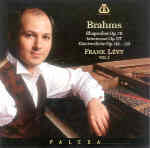The Swiss-born/New York-based Frank Levy is a Brahms pianist to the manner born. He favors the tonally expansive, broad-shouldered approach Wilhelm Backhaus seemingly patented years ago, carried out to more supple effect today by Emanuel Ax. In contrast to the nervous tension and high profile linear movement favored by Lars Vogt, Ivo Pogorelich, Idil Biret, and to a lesser extent, Richard Goode, Levy’s long-lined phrases and poetic impulses operate at a lower voltage–yet there’s plenty of power when needed, as the Op. 79 Rhapsodies make clear. The only instance where I infer flagging energy occurs in Op. 119 No. 4’s strenuous final pages, but the equally demanding G minor Ballade Op. 118 No. 3 gets a lighter, less choppy reading than we often hear. Levy may not leave an impression in this repertoire as individual as his more famous colleagues (together with Kempff, Katchen, Lupu, Rubinstein, and Gould), yet his sensitive and intelligent interpretations wear extremely well over time. I look forward to further volumes in what we can only hope will be a complete Brahms cycle from this pianist.
































